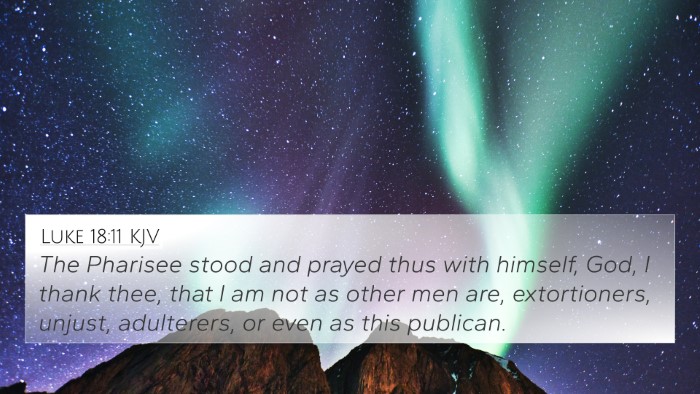Understanding Luke 18:21
Luke 18:21 states: "And he said, All these things have I kept from my youth up." This verse follows a conversation between Jesus and a rich young ruler who asked what he must do to inherit eternal life. The ruler, in his earnestness, claimed to have adhered strictly to the commandments from an early age.
Meaning and Analysis
The rich young ruler's response reflects his belief in personal merit and adherence to the law. Commentators agree that this illustrates a common misunderstanding of salvation—that one can earn eternal life through good deeds alone. Here we will explore insights drawn from respected public domain commentaries.
Commentary Insights
-
Matthew Henry:
Matthew Henry interprets this verse as an insight into the young ruler's self-righteousness. He notes that this claim of having kept the law is not a sign of true spiritual understanding, but rather a reflection of the ruler’s lack of recognition of human fallibility and the necessity of divine grace. Henry emphasizes the importance of the heart's condition over outward actions.
-
Albert Barnes:
Barnes provides a detailed examination of the ruler's declaration, indicating that while the commandments were upheld, there was likely a superficial quality to his obedience. He points out the infinite standard of God's law, which requires not only action but also the right intention. Barnes highlights that the young man’s inability to see his own sinfulness led him to believe he was righteous.
-
Adam Clarke:
Clarke dives into the implications of the phrase "from my youth up," suggesting that this indicates a long history of religious observance. He warns that such a background can foster a false sense of security in one’s righteousness. Clarke emphasizes that true discipleship requires more than rule-following; it demands a heart transformed by faith and commitment to Christ.
Cross-References
Luke 18:21 is interconnected with several significant biblical passages that enhance its understanding:
- Matthew 19:16-17: Similar account of the rich young ruler seeking eternal life.
- Mark 10:17-22: Another parallel that details the conversation with the young ruler.
- Romans 3:20: Highlights the futility of seeking righteousness through the law.
- Galatians 2:16: Emphasizes justification by faith, not by works of the law.
- Ephesians 2:8-9: Affirms salvation as a gift of grace through faith.
- Luke 10:27: Illustrates the true essence of the law: love for God and neighbor.
- Acts 15:10-11: Apostles affirm grace as the true way of salvation.
Thematic Connections
This verse connects thematically with discussions on the nature of faith, grace, and the Christian understanding of law versus works. The conversation illustrates key biblical principles:
- Salvation by Grace: The man’s reliance on his merit contrasts with the New Testament’s teaching on grace.
- True Obedience: Genuine faith manifests in the heart's condition rather than mere compliance with rules.
- The Cost of Discipleship: Following Jesus may require sacrifices contrary to one’s desires or riches.
Practical Application
Understanding Luke 18:21 encourages believers to reflect on their own faith. It invites us to:
- Examine our motivations: Are our actions rooted in love and faith, or in a desire for self-justification?
- Embrace the gift of grace: Recognize that our standing before God is not based on our deeds but on Christ’s finished work.
- Prioritize relationship over religion: The call is to engage in a transformative relationship with Jesus rather than mere adherence to rules.
Conclusion
In summation, Luke 18:21 serves as a reminder of the tension between law and grace, illustrating the profound truth that our reliance should be on Christ alone for salvation. The inputs from various commentaries enrich our understanding and encourage deeper reflection on our personal faith journey. The connections drawn between this verse and others build a cohesive dialogue throughout Scripture, amplifying the sacred themes of relationship, grace, and genuine transformation in Christ.
Further Study Tools
For those interested in diving deeper into cross-referencing biblical texts, consider utilizing:
- Bible Concordance: A useful tool for finding specific verses and their themes.
- Bible Cross-Reference Guide: Helpful in finding scriptures that relate to specific passages.
- Bible Chain References: For tracing themes through a sequence of verses.
As you explore these resources, you will uncover rich connections and insights that can deepen your understanding of Scripture.









